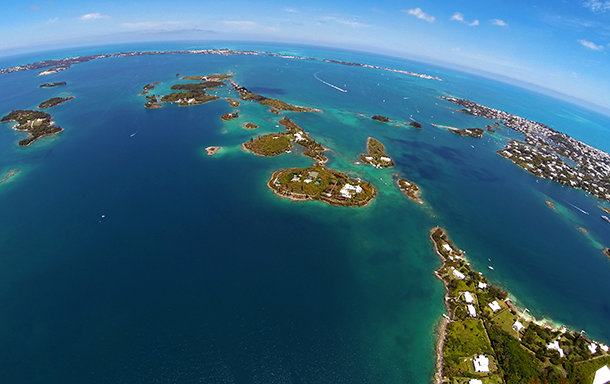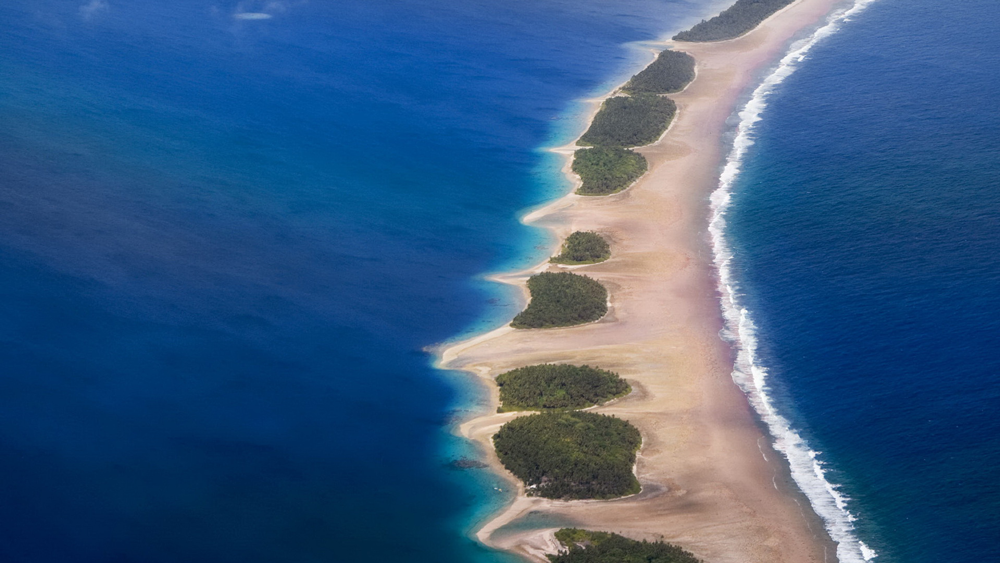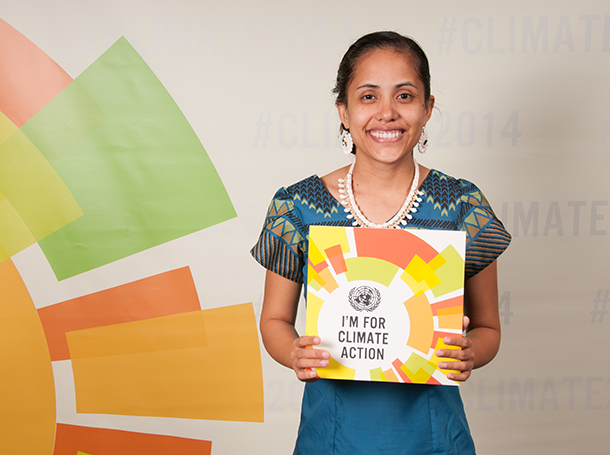Poetic Plea for the Marshall Islands
Air Date: Week of January 26, 2018

The Marshall Islands are threatened by rising seas. (Photo: BermudaMike, Flickr CC BY-NC-ND 2.0)
The Marshall Islands’ thousands of residents are extremely vulnerable to climate change. Poet Kathy Jetnil-Kijiner describes life on the island and the threat from rising seas, and performs her poem “Tell Them.”
Transcript
CURWOOD: For some nations, climate disruption poses an existential threat right now. Topping that list are low-lying countries already losing acres to rising seas such as Bangladesh and the many small island states, including the Maldives and Marshall Islands. These islands have long demanded action to curb global warming gas emissions at the United Nations, perhaps most prominently at the December 2015 Climate Conference when the Paris Agreement was forged. And the words spoken in Paris by a Marshall Island poet still resonate.
JETNIL-KIJINER: My name is Kathy Jetnil-Kijiner, I’m from the Marshall Islands. The Marshall Islands is in the Northern Pacific Ocean and it's in an area called Micronesia. It's a small country, it's not very developed. You know, there's just one road, like just one main road, running through the entire island. There's no traffic lights, there’s no malls, there’s no Burger King, MacDonald’s, none of that happens there. It's very very flat, there's no mountains at all, it’s just ocean all around you, which I heard people say that kind of scares them.
[SOUND OF GENTLE WAVES]
It freaks them out when they're first there, like everywhere you turn you see the ocean. And there's coconut trees. Some parts are really lush and beautiful, some parts are not. Our people were known to be canoe navigators, we're also known to be really fine mat weavers. And there's just kids everywhere.
[SOUNDS OF KIDS PLAYING AND WAVES]
You just see kids running around all over the place. Basically, Marshall Islands is only one meter above sea level and so we're extremely vulnerable to the rising sea level. And so we’re extremely vulnerable to the rising sea level. We have these things called, like, sea walls, which are walls we built to keep the ocean out of their homes, and recently we've been having multiple floodings. Just within this year alone, we've had four breaches ... water being so high that it would crash into our homes, destroy, completely obliterate and destroy homes, like completely level it out.
I was out two weekends ago, you know, running errands, and I saw these women and children fundraising with a car wash and BBQ plates, and so I went to buy a BBQ plate. And I said, "What are you fundraising for?" And the women, said, “Our sea walls are broken,” and I was like, "Oh, from the recent flooding?" And they said, “Yes, just the recent one. It broke all of our sea walls." It was a whole community of houses whose sea walls were broken. And they sent me all of these photos, you know, of these completely messed up sea walls, parts of their houses just like totally messed up. And you know, they're not rich, these people. They're having to figure out ways to fix their sea walls, raise funds. Our minimum wage is $2 dollars an hour. And so we're already struggling as it is, as a people, you know, as a country. But then, we have climate change on top of this and it just exacerbates the situation.
I'm a poet and a performer. I'm actually here with the Global Call for Climate Action. GCCA brought me and four other poets out here for the Spoken Word for the World project to raise awareness on various issues on climate change. Our poetry is meant to bring the humanity back into the issues that we're discussing.
TELL THEM
I prepared the package
for my friends in the States
First, the dangling earrings woven
into half-moons, black pearls glinting
like an eye in the storm of tight spirals
Second, the baskets
sturdy, also woven
brown cowrie shell shiny
intricate mandalas
shaped by calloused fingers
Inside the basket
I write a message:
wear these earrings
to parties
to classes and meetings
to the corner store, the grocery store
or while riding the bus
Store jewelry, incense, copper coins
and curling letters like this one
in this basket
And when others ask you
where you got this
you tell them
they're from the Marshall Islands

The Marshall Islands are comprised of 1,156 islands and islets. (Photo: Keith Polya, CC BY 2.0)
show them where it is on a map
tell them we are a proud people
toasted dark brown as the carved ribs
of a tree stump
tell them we are descendants
of the finest navigators in the world
tell them our islands were dropped
from a basket
carried by a giant
tell them we are the hollow hulls
of canoes as fast as the wind
slicing through the Pacific sea
we are wood shavings
and drying Pandanus leaves
and sticky bwiros at kemems
tell them we are sweet harmonies
of mothers, aunties, sisters
songs late into night
tell them we are whispered prayers
the breath of God
a crown of fuchsia flowers encircling
Auntie Mary’s white sea-foam hair
tell them we are styrofoam cups of Kool-Aid red
waiting patiently for the ilomij
we are papaya-golden sunsets bleeding
into a glittering, open sea
we are skies uncluttered
majestic and sweeping in their landscape
tell them we are dusty rubber slippers
swiped
from concrete doorsteps
we are the ripped seams
and the broken door handles of taxis
we are sweaty hands shaking another sweaty hand in heat
tell them
we are days
and nights hotter
than anything you can imagine
tell them we are little girls with braids
cartwheeling beneath the rain
tell them we are shards of broken beer bottles
burrowed beneath fine white sand
we are children flinging
like rubber bands
across a road clogged with chugging cars
tell them
we only have one road

Kathy Jetnil-Kijiner is a Marshallese poet, writer, performance artist, and journalist. (Photo: Simon Ruf/UN Social Media Team, Flickr CC BY-ND 2.0)
and after all this
you tell them about the water
tell them how you have seen it rising
flooding across our cemeteries
gushing over our seawalls
and crashing against our homes
tell them what it's like
to see the entire ocean level with the land
tell them
we are afraid
tell them we don't know
of the politics
or the science
but we see
what's in our own backyard
tell them some of us
are old fishermen who believe that God
made us a promise
tell them some of us
are a little bit more skeptical
but most importantly you tell them
that we don't want to leave
that we've never wanted to leave
and that we
are nothing without our islands.
CURWOOD: Marshall Islands poet Kathy Jetnil-Kijiner with her poem, "Tell them," recorded at the 2015 Paris Climate Conference. President Trump has moved to leave the Paris Climate Agreement, making the US the only nation outside the compact, though that will take until 2020.
Links
More spoken word poetry by Kathy Jetnil-Kijiner
NBC: Pacific Islander Poets Use Art, Stories to Urge Climate Action at UN Conference
Living on Earth wants to hear from you!
Living on Earth
62 Calef Highway, Suite 212
Lee, NH 03861
Telephone: 617-287-4121
E-mail: comments@loe.org
Newsletter [Click here]
Donate to Living on Earth!
Living on Earth is an independent media program and relies entirely on contributions from listeners and institutions supporting public service. Please donate now to preserve an independent environmental voice.
NewsletterLiving on Earth offers a weekly delivery of the show's rundown to your mailbox. Sign up for our newsletter today!
 Sailors For The Sea: Be the change you want to sea.
Sailors For The Sea: Be the change you want to sea.
 The Grantham Foundation for the Protection of the Environment: Committed to protecting and improving the health of the global environment.
The Grantham Foundation for the Protection of the Environment: Committed to protecting and improving the health of the global environment.
 Contribute to Living on Earth and receive, as our gift to you, an archival print of one of Mark Seth Lender's extraordinary wildlife photographs. Follow the link to see Mark's current collection of photographs.
Contribute to Living on Earth and receive, as our gift to you, an archival print of one of Mark Seth Lender's extraordinary wildlife photographs. Follow the link to see Mark's current collection of photographs.
 Buy a signed copy of Mark Seth Lender's book Smeagull the Seagull & support Living on Earth
Buy a signed copy of Mark Seth Lender's book Smeagull the Seagull & support Living on Earth

